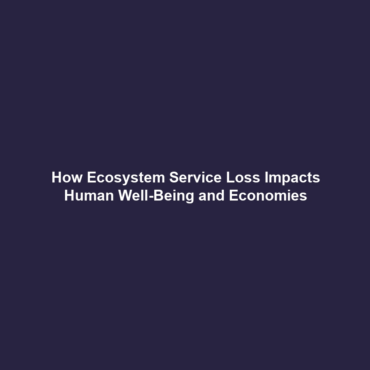Examples of How Ecosystem Service Loss Directly Affects Human Well-Being and Economies
Introduction
Understanding the examples of how ecosystem service loss directly affects human well-being and economies is crucial for addressing the pressing issues of deforestation and biodiversity loss. Ecosystem services, the benefits that nature provides to humanity, play a vital role in sustaining life and supporting economies across the globe. The depletion of these services due to human activities poses significant challenges, disrupting the balance of natural systems and ultimately impacting our health, livelihoods, and economic stability.
Key Concepts
Major Principles of Ecosystem Services
Ecosystem services are typically categorized into four main types: provisioning, regulating, cultural, and supporting services. Each of these plays a distinct role in ensuring the functionality of ecosystems and, by extension, human well-being:
- Provisioning Services: These include the supply of food, fresh water, and raw materials. Loss of biodiversity directly affects food security and availability.
- Regulating Services: Ecosystems help regulate climate, disease, and water quality. The disruption of these services can lead to increased health risks and economic burdens.
- Cultural Services: Nature contributes to mental and spiritual well-being, providing recreational and aesthetic benefits. Loss of biodiversity can diminish these experiences.
- Supporting Services: These include nutrient cycling and soil formation, essential for food production. Their loss jeopardizes agricultural sustainability.
Applications and Real-World Uses
Understanding how ecosystem service loss is used in the context of deforestation and biodiversity loss has practical implications for policy-making and economic planning. Here are some significant real-world applications:
- Policy Development: Integrating ecosystem services into national and local policies can help mitigate the impacts of biodiversity loss.
- Environmental Restoration: Initiatives to restore ecosystems may directly enhance the services they provide, improving human well-being and economic outcomes.
- Corporate Strategies: Businesses are increasingly recognizing the value of maintaining ecosystem services to ensure sustainable operations and safeguard their supply chains.
Current Challenges
Despite growing awareness, challenges remain in studying and applying the principles of ecosystem service loss:
- Data Deficiencies: There is often insufficient data on the economic valuation of ecosystem services.
- Policy Gaps: Inconsistent policies across regions can hinder effective management of natural resources.
- Public Awareness: Limited understanding of ecosystem services among the general public complicates conservation efforts.
Future Research and Innovations
Innovations and ongoing research in ecosystem services are paving the way for tackling the issues surrounding biodiversity loss. Key areas of focus include:
- Remote Sensing Technologies: Enhanced tracking of ecosystem changes using satellites can lead to better management strategies.
- Economic Incentives: Programs that financially reward conservation efforts can motivate communities to protect local ecosystems.
- Community-Driven Approaches: Engaging local populations in conservation efforts promises sustainable outcomes that also consider cultural values.
Conclusion
In summary, the examples of how ecosystem service loss directly affects human well-being and economies highlight the urgent need to address the issues of deforestation and biodiversity loss. By understanding the significance of ecosystem services, we can foster better policies and practices aimed at preserving our natural resources. It is imperative for individuals, communities, and policymakers to collaborate in safeguarding these essential services for future generations. For more insights into related topics, visit our pages on Deforestation and Biodiversity Loss.
